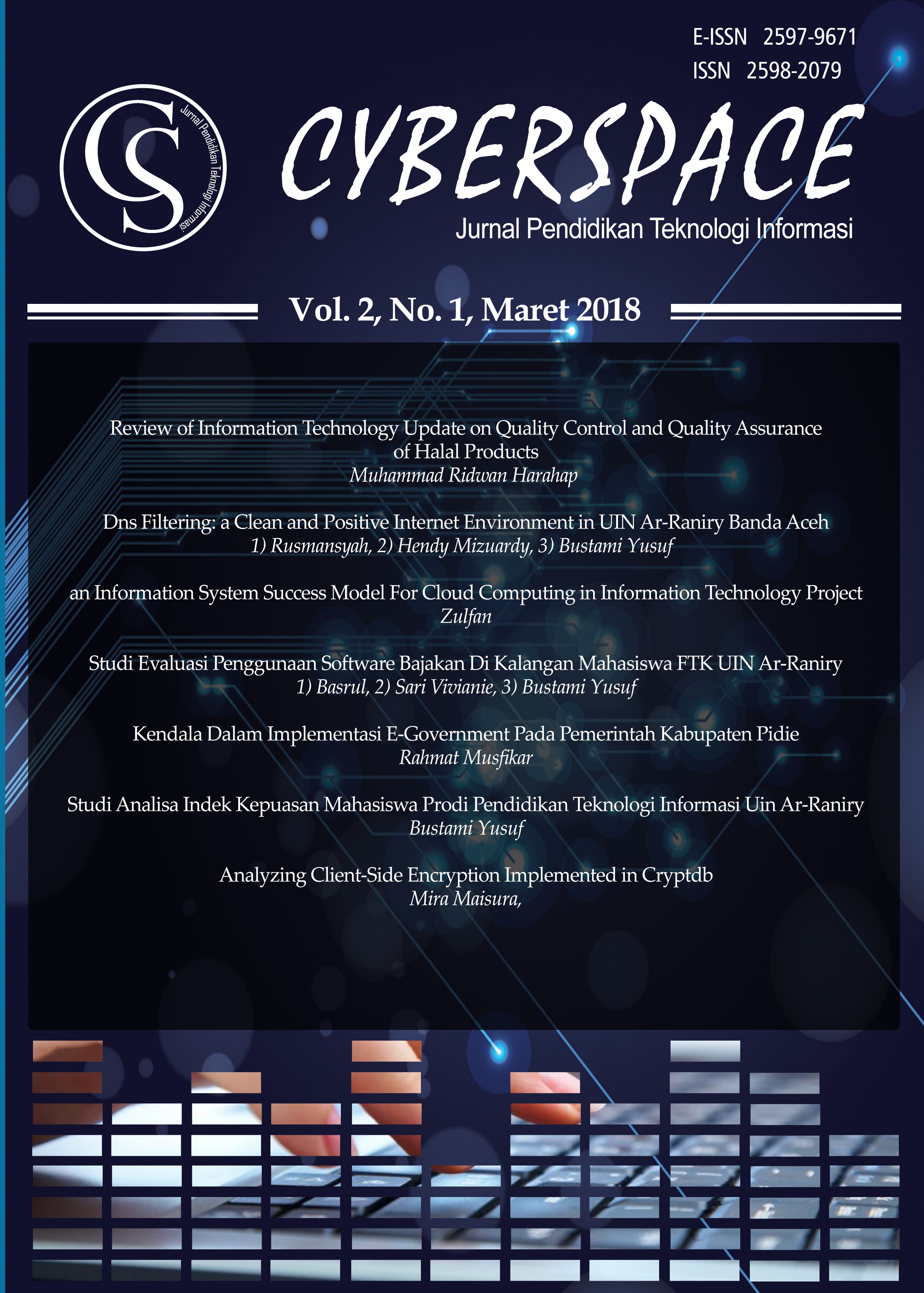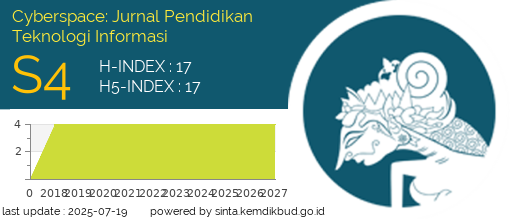KENDALA DALAM IMPLEMENTASI E-GOVERNMENT PADA PEMERINTAH KABUPATEN PIDIE
DOI:
https://doi.org/10.22373/cs.v2i1.2746Keywords:
e-government, Government, Pidie, Partial Least Square, bootstrappingAbstract
Nowadays, we are faced with technological era, where the use of information and communication technology in the world is growing rapidly. The government program to realize the application of technology information is E-Government. The implementation of E-Government in Indonesia is highly growing and there are laws and regulations on E-Government from Indonesia government. Currently, the Government of Indonesia has reached the stage of evaluation through E-Government Rating Indonesia. This study aimed to know the obstacles in implementing E-government in Pidie district government. This study used previous studies, frameworks and theories to create a suitable new model in Pidie District. To propose a new model, this study attempted to combine, synthesize and conduct a re-factor. The methodology used in this study is a quantitative approach by using questionnaire distribution technique to government employees. The method for sampling used is nonprobability technique namely purposive sampling. Data analysis technique used in this research is Partial Least Square (PLS). The technique used to test the hypothesis statistically is bootstrapping on the PLS. The hypothesis proposed in the study is that there were 3 obstacles in implementing e-government in Pidie district government. The results of this study shows that the obstacles that greatly affected the implementation of e-government in Pidie government was the organizational factor, while the other two factors, Human Resources (HR) and the infrastructure factor, did not show a significant effect.References
Pemerintah Republik Indonesia, Presiden Republik Indonesia.“ Intruksi President Nomor 3 Tahun 2003 Tentang Kebijakan dan Strategi Nasional Pengembangan E-government. Indonesiaâ€. 2003.
Indonesia Governance Index.â€Indonesia Governance Index 2012 (“Tantangan Tata Kelola Pemerintahan di 33 Provinsiâ€)â€. Jakarta : The Partnership for Governance Reform (Kemitraan). .2013.
Alshehril, Mohammed; dan Drew, Steve J.†E-government principles: implementation, advantages and challengesâ€. Queensland :Inderscience Enterprises Ltd. .2007
Lee, Nag Yeon.(2013). Modul 3: Penerapan e-Government. Academy Modules (Bahasa Version).United nation : Asian and Pacific Training Centre for Information and Communication Technology for Development (APCICT). Access on 5 Desember 2013.http://www.unapcict.org/academy/academy/academy-modules/bahasa-indonesia-version
Pemerintah Indonesia, Direktorat E-government, Direktorat Jenderal Applikai Informatika.â€Pemeringkatan E-government Indonesia Tingkat Kabupaten/Kota di Wilayah Provinsi Aceh Tahun 2011â€. Indonesia : Kementerian Komunikasi dan Informatika Republik Indonesia.2011
Pemeringkatan e-government Indonesia.(2013). Tentang Pemeringkatan e-government Indonesia (PeGI).Jakarta : kementerian Komunikasi dan Informatika. Access on 10 Desember 2013. http://pegi.layanan.go.id/tentang-pegi/
Rakhmanov, Rakhmanov. “The barriers affecting E-government development in Uzbekistanâ€. South Korea : Seoul National University. Fourth International Conference on Computer Sciences and Convergence Information Technology. 978-0-7695-3896-9/09. (2009).
Avison, D; dan Fitzgerald, Guy. “Information System Developmentâ€. Singapore: Mc Graw Hill.2006
Gates, Linda Parker. “Strategic Planning with Critical Success Factors and Future Scenarios: An Integrated Strategic Planning Frameworkâ€. Hanscom : Carnegie Mellon University.2010
Esteves de Sousa, José Manuel. â€Definition and Analysis of Critical Success Factors for ERP Implementation Projectsâ€. Barcelona : Universitat Politècnica de Catalunya
Wanhua, Xu; Guoping, Zhou. “The Development Of E-government In China : Challenges and The Futureâ€.Wuhan : Hubei University of Economics. IEEE. 978-1-4244-2108-4/08. 2008
Altameem, Torki; Zairi, Mohamed; Alshawi, Sarmad. “Critical Success Factors of E-government: A Proposed Model for E-government Implementationâ€. London : Brunel University. IEEE. 1-4244-0674-9/06. 2006
Furuholt, Bjorn; dan Wahid, Fathul. “E-government Challenges and the Role of Political Leadership in Indonesia: the Case of Sragenâ€. Proceedings of the 41st Hawaii International Conference on System Science, 2008. IEEE. 1530-1605/08. 2008
Kim, Young-Sik; Pokhare, Manish; dan Lee, Byung-Seub.â€E-government Implementation Strategy in Least Developed Countries: A Nepalese Caseâ€. Goyang City : Korea Aerospace University. ICEGOV2007, December 10-13, 2007, Macao. ACM 978-1-59593-822 -0/07/12. 2007
Ningsih, Yulia Razila.†Faktor Faktor Penghambat E-government: Studi kasus Pemerintah Provinsi Riauâ€. Jakarta : Fakultas Ilmu Komputer, Universitas Indonesia, Karya Akhir, Magister Teknologi Informasi.2013
Novita,Dien.â€.Faktor Faktor Penghambat Pengembangan E-government: Studi kasus Pemerintah Kota Palembang Sumatera Selatanâ€. Jakarta : Fakultas Ilmu Komputer, Universitas Indonesia, Karya Akhir, Magister Teknologi Informasi.2011
Faizah, Nurul.†Faktor Faktor Sukses Implementasi E-government di Empat Kabupaten/Kota di Indonesiaâ€. Jakarta : Fakultas Ilmu Komputer, Universitas Indonesia, Karya Akhir, Magister Teknologi Informasi.2009
Sugiyono.â€Metode Penelitian Kombinasi (Mixed Methods)â€. Bandung : Alfabeta.2013
Sarwono, Jonathan.â€.Metode Riset Skripsi Pendekatan Kuantitatif (Menggunakan Prosedur SPSS)â€.Jakarta: PT. Elex Media Komputindo.2012
Hasibuan, Zainal A.†Metodologi Penelitian Pada Bidang Ilmu Komputer dan Teknologi Informasiâ€. Depok : Universitas Indonesia.2007
A. Somantri; dan S. A. Muhidin.â€Aplikasi Statistika Dalam Penelitianâ€. Bandung: Pustaka Setia.2006
Gulati ,Girish J.; “Jeffâ€; Yates, David J.; dan Williams, Christine B. “Understanding the Impact of Political Structure, Governance and Public Policy on E-governmentâ€. Massachusetts : Bentley University. 45th Hawaii International Conference on System Sciences. DOI 10.1109/HICSS.2012.617. IEEE. 978-0-7695-4525-7/12. 2012
Wang, Heng; dan Hou, Jinchang.â€The External and Internal Barriers to E-government Implementationâ€. China : Shandong University of Finance. IEEE. 978-1-4244-5326-9/10. 2010
Latan, Hengky; dan Ghozali, Imam. “Partial Least Squares Konsep, Teknik dan Aplikasi Smart PLS 2.0 M3â€.Semarang : Badan Penerbit Universitas Diponegoro.2012
Downloads
Published
Issue
Section
License
Authors who publish with Cyberspace Journal agree to the following terms:
- Authors retain copyright and grant the journal right of first publication with the work simultaneously licensed under a Creative Commons Attribution License that allows others to share the work with an acknowledgement of the work's authorship and initial publication in this journal.
- Authors are able to enter into separate, additional contractual arrangements for the non-exclusive distribution of the journal's published version of the work (e.g., post it to an institutional repository or publish it in a book), with an acknowledgement of its initial publication in this journal.
- Authors are permitted and encouraged to post their work online (e.g., in institutional repositories or on their website) prior to and during the submission process, as it can lead to productive exchanges, as well as earlier and greater citation of published work (See The Effect of Open Access).



















